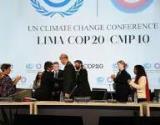Published on Fri, 2014-12-12 07:20
In 2020, will 2014 seem like a turning point in the way the human rights system began to properly adapt to the challenges posed by the modern economy? In June this year the Human Rights Council passed a resolution establishing a new intergovernmental working group to establish a treaty to address corporate-related human rights violations. Before last week’s third UN Forum on Business and Human Rights a member of the pre-existing UN Working Group on Business & Human Rights – whose members have so far been silent on the June – is now supportive of the development of a treaty. |
Published on Fri, 2014-12-05 23:00
The principle of common but differentiated responsibilities (CBDR) is considered one of the key achievements of the UN Conference on Environment and Development in Rio de Janeiro in 1992. Twenty years later, this principle has become a focal point of current negotiations on climate change and the post-2015 agenda. The developing countries that make up the Group of 77 want to preserve the principle unchanged. However, the US, EU and other industrialized countries want to do away with it in its present form. They argue that global power structures have changed. In their view, fair burden sharing must include contributions to climate protection from emerging economies like China, India and Brazil. "If consensus cannot be found, there will be neither a new global climate treaty nor a global development agenda worthy of the name in 2015" writes Global Policy Forum's director, Jens Martens. |
Published on Fri, 2014-12-05 20:00
As part of the 16 Days Campaign Against Gender Based Violence (November 25 – December 10, 2014) AWID is honoring Feminists and Women Human Rights Defenders (WHRDs) Who Are No Longer With Us and whose contributions to the advancement of human rights are very much missed. Find out more here. |
Published on Fri, 2014-12-05 19:42
The annual United Nations climate treaty conference kicks off in Lima, Peru, against the backdrop of several key events in the climate change arena. These include the most recent release of the Intergovernmntal Panel on Climate Change's Summary for Policy- Makers relating to the Synthesis Report of its Fifth Assessment Report, the US-China joint announcement of their post-2020 actions on climate change, and the US$9.7 billion pledged to the Green Climate Fund. |
Published on Fri, 2014-12-05 09:54
The UN Guiding Principles, while not perfect, provide the clearest expression yet of the international community’s expectations of the human rights responsibilities of corporations, including private sector banks. The most notable response by the banking sector to date has been the formation of the Thun Group in 2011 to discuss the implementation of the Principles, and their first discussion paper, launched in 2013. More than one year from the launch of this paper, and more than three years from the launch of the Guiding Principles themselves, a new study released by BankTrack, “Banking with principles? Benchmarking banks against the UN Guiding Principles on Business and Human Rights”, attempts to assess how banks are doing at implementing the Principles into their own operations, policies and reporting. |
SUSCRIBE TO OUR NEWSLETTER






